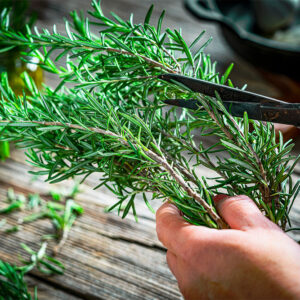
MAILBAG! Keep Your Blood Pressure in Check Naturally
Dear Living Well Daily Reader,
“What are some ways I can keep my blood pressure under control, naturally?”
–Jeremy from Akron, Ohio
Hi Jeremy,
Let me start by saying that any changes to blood pressure medications should only be done with the help of your health care practitioner. Stopping blood pressure drugs suddenly can cause serious health issues, some of which can be life-threatening.
But I recommend many things beyond taking drugs to help keep blood pressure in a normal, healthy range.
Blood pressure is the measurement of the pressure inside your blood vessels. There are two numbers (like 120/80) because the pressure is higher when your heart beats and lower when it relaxes.
The lowest (diastolic) is the background pressure, and the highest number (systolic) is the increased pressure that results from the beating of the heart.
I like to see both numbers to drop as close to the ideal 120/70 reading as possible.
In most cases, this is done naturally with a combination of lifestyle changes and nutritional support.
Start with exercise. But you don’t have to join a gym or buy a bunch of fancy exercise equipment. The best exercise is simply walking. Start out at an easy pace and increase your speed as you improve.
I recommend spending up to four hours a day standing or walking. The less time spent sitting, the better your blood pressure will likely be.
If you’re carrying around any extra weight, try to lose those extra pounds. Focus on eating more healthy proteins and low-sugar veggies. Avoid sugar, foods that act like sugar inside the body (like simple carbs), and vegetable oils.
Next, consider adding some blood-pressure-friendly supplements to your routine.
- Fish Oil: Studies have shown that Omega-3 fatty acids (found in fish oil) can reduce heart disease by up to 52 percent. Fish oils reduce inflammation and soften up arteries, so they stay flexible. I suggest you take between 1,000 and 3,000 milligrams a day.
- CoQ10 (CoenzymeQ10): This antioxidant/enzyme is found throughout our bodies and is used for energy production. Since our heart is one of the most energy-hungry organs in our bodies, it needs CoQ10. But CoQ10 goes beyond that. It’s also a powerful antioxidant that works both inside and outside the cells. CoQ10 lowers inflammation, reduces blood clots, and helps prevent skipped beats (like arrhythmias or atrial fibrillation).
- Vitamin C: Vitamin C helps prevent damage to LDL cholesterol and can keep arteries more flexible. Remember, we’re one of a few mammals that can’t produce their own vitamin C. If you don’t supplement, you don’t get enough of this vitamin, so add it to your list.
- Antioxidants: There are many antioxidants to choose from, like vitamins A, C, and E, but I prefer plant phytonutrients such as carotenoids, polyphenols, and flavonoids for great antioxidant protection. Examples include green tea extract – called EGCG (epigallocatechin gallate), red wine extract (resveratrol), pycnogenol, olive leaf extract, curcumin, and others.
- Hawthorn: This herb has long been used for heart health. It helps lower blood pressure while also strengthening the heart muscle. Hawthorn berries are full of flavonoids for extra antioxidant protection.
- Garlic: 1,000 milligrams of garlic extract has been shown to help lower blood pressure.
Making these small changes to your regular routine can help you keep your blood pressure in check naturally.
PS: Still struggling to keep your blood pressure under control? THESE common drugs could be to blame.
Written By Dr. Scott Olson, ND
Nearly 25 years ago, failed mainstream medical treatments left Dr. Olson in constant pain – and his health in ruins. And that’s when he did something REVOLUTIONARY. He began his career in medicine – and dedicated his life to uncovering the true, underlying causes of disease.
Through his innovative medical practices in Tennessee and Colorado, Dr. Olson has helped cure countless seniors from across America of arthritis… heart disease… diabetes… and even cancer. All without risky prescription drugs or painful surgeries.
View More Free Articles
America’s Next Prescription Epidemic?
It started with a prescription to help you stay focused… But now, for millions of Americans, that little orange pill bottle could be a gateway to something much darker. According to a brand-new national study, one in four adults prescribed stimulants for ADHD is misusing them—and nearly one in 10 has developed a full-blown use...
Is Your Diet ACTUALLY Healthy? Here’s How to Tell
I’ve probably uttered the phrase “healthy diet” when talking to patients, family, and friends more times than I’ve had cups of coffee—and that’s saying something! But I’ll admit it’s not always entirely clear what a healthy diet looks like. What does healthy eating really mean? Let’s take a look… Good news—healthy eating doesn’t mean you...
7 Natural Ways to Tackle Pain Without Pills
On Tuesday, we explored a promising new frontier in pain relief: terpenes, natural compounds found in cannabis (and other plants) that may ease pain without the risks of opioids. That research is still developing. But what if you’re looking for help right now? Good news: You don’t have to wait for a pharmaceutical breakthrough to...
Mailbag: Pinched to Pain Free with Natural Sciatica Solutions
“I have been suffering from sciatic pain in my hip and groin. I try to do exercises to stretch it. But ever since I slipped on the ice and fell on my left hip it seems to be getting worse. Is there any help for this?” -Painfully Pinched Dear Pinched, I understand how frustrating sciatic...
New Cannabis Discovery Could Ease Pain—Without the High
A few years ago, everywhere you turned, someone was talking about CBD. The cannabis extract had exploded in popularity for everything from anxiety to inflammation to joint pain. And while the CBD conversation continues, another cannabis compound is quietly making headlines. One that could—believe it or not—provide relief from all kinds of pain. Without the...
"Sinful Trio" SLASHES Metabolic Syndrome Risk
Are you tired of hearing your doctor’s endless “don’t eat this, don’t drink that” lectures? Well, this Easter Sunday, I’ve got news that might just have you hopping happily to your pantry. Turns out, some of life’s tastiest pleasures could help protect you from one of today’s most common health threats—metabolic syndrome. Let’s dig into...
Microplastics’ Hidden Link to Chronic Disease EXPOSED
By now, you’ve heard about microplastics. These tiny fragments of plastic have invaded virtually every corner of our planet. We’re just beginning to understand the scope of the threat, but we know microplastics pose a serious risk to our health. If you’re like many folks, you’ve shrugged off those dangers, thinking there’s nothing you can...
Shakespeare’s “Remembrance” Herb Protects Memory
You probably have a jar of rosemary sitting in your spice rack. Perhaps you sprinkle it on potatoes or add it to roast chicken. But what if this humble herb could hold the key to fighting one of the most devastating diseases we can face as we age? It turns out a hidden compound inside...
Is Your Gut “Good”? How to Check
I always get asked, “How do I know if my digestion is working right?” Well, the answer is pretty simple, but it’s also a little gross. A simple test you can do at home reveals whether your digestion is normal or not. Your digestive system processes everything you eat—extracting nutrients, and eliminating waste. The time...
Hidden Sugar Trap Fuels Lung Cancer
We’ve long known that smoking is the main villain behind lung cancer. But what if your dinner plate has quietly joined forces with the enemy? A new study from the University of Florida reveals that the typical Western diet could be laying the groundwork for aggressive lung cancer growth by feeding tumors with stored sugar....









